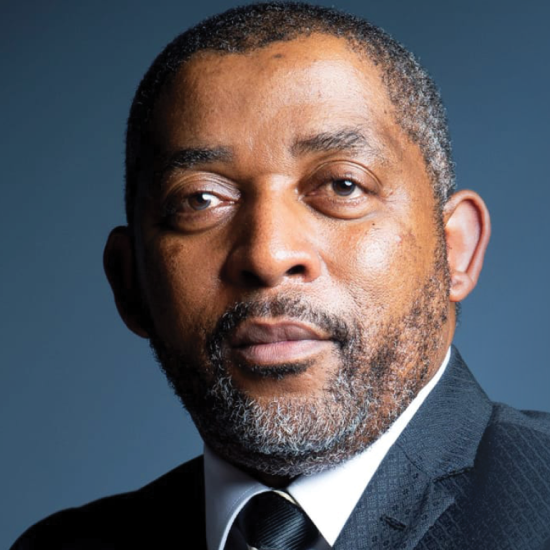Vuyani Jarana puts
African startups on global stage

In a milestone appointment that signals South Africa’s growing influence in global entrepreneurship, seasoned Business Executive Vuyani Jarana has been named Chairperson of the StartUp20 for South Africa’s G20 Presidency.
The appointment comes as South Africa holds the G20 Presidency, marking the third year of StartUp20’s existence since it was launched in India in 2023 and expanded in Brazil last year.
StartUp20 is one of the official G20 engagement groups – born out of the B20 – that focuses on fostering a global startup ecosystem. The platform unites policymakers, investors, entrepreneurs, and ecosystem enablers with a single aim: creating an enabling environment for startups to thrive across G20 nations and beyond.
Pan-African
In an exclusive interview with Public Sector Manager magazine, Jarana outlined an ambitious vision that extends beyond South Africa’s engagement to encompass the African continent’s broader participation.
“StartUp20 is an engagement group, a pillar of B20. We are in the third year of it now,” said Jarana. “Its focus is on promoting global entrepreneurship by ensuring that G20 leaders create an environment where startups and entrepreneurship can thrive. This includes looking at areas like accelerators and incubators – how do we invest in these platforms so that startups can mature in a productive environments? We are building an ecosystem that enables startups to drive value through a comprehensive value chain.”
According to Jarana, the value chain support structure is essential: “It is about creating a conducive environment for startups in different countries to succeed. You have to look at policy enablement and things like access to finance, access to markets, inclusion and sustainability.”
For South Africa, Jarana emphasises that inclusion must go beyond buzzwords: “In South Africa’s case, inclusion means bringing more young people, women, and township and rural enterprises into the mainstream economy. We have specifically addressed this through a task force in the South African Charter.”
The South African agenda seeks to institutionalise these goals beyond the summit. “We want to create an institutional base that enables ongoing coordination and shines the spotlight on startup issues, especially for the continent,” Jarana explained.
Five strategic task forces
Under Jarana’s leadership, the StartUp20 Engagement Group has established five task forces designed to tackle the most pressing issues in the global startup ecosystem:
- Foundation and alliances: This task force focuses on policy frameworks to enable the foundations of entrepreneurship. “It is about looking at what policy framework needs to be put in place so that startups have the right conducive environment to thrive and grow at the foundational level – covering accelerators, incubators, and the broader ecosystem,” he explained.
- Access to finance and investment: In this regard, he said the question was: “How do we ensure that startups, that often do not have strong balance sheets and any collateral, still have access to finance?” He said the point was not to lament what was not happening, “but for the task forces to find fresh ideas around balancing risk and opportunity in providing investment.”
- Market access and trade: “This is not just about South Africa or Africa. We are looking at international corridors to that products from startups and small businesses can use for exports. The question is: are there specific trade arrangements that global leaders could agree upon, focusing on products from startups and SMEs?”
- Inclusion and sustainability: This workstream will discuss how countries can get more of the youth involved. “How do we get women involved? How do we get people with special needs involved? This work group has to examine all the barriers and explore new ideas for actually addressing these barriers to entry.”
- Township and rural enterprises: “While this workstream falls under inclusion, we decided to make it a standalone to ensure we do not compromise either the youth, women, and disabilities agenda or the township and rural enterprises focus.”
Continental impact
Jarana was emphatic that StartUp20 South Africa is not a domestic initiative, but needs to must reflect the ambitions and aspirations of the entire African continent.
“Top of mind is to ensure that it is not just a South African thing. The continent must be involved. But the other 17 G20 countries also have to be actively involved to ensure we can actually set the agenda.”
There are already plans to collaborate with the African Union (AU), which is now a G20 member. He also hinted at potential Southern African Development Community (SADC) regional engagement platforms: “We think there is an opportunity to do something for the region, with the possibility of incorporating SADC engagement into the different summits we want to hold.”
A lasting institution
Looking ahead, Jarana wants StartUp20 to become a lasting institution.
“The first thing that is important is to examine the five themes and develop concrete recommendations from each one, building on the work done in India and Brazil.”
But it is not just about policy documents. “What we want to do as South Africa is institutionalise the StartUp20 Engagement Group – create an institution behind it – so that it is not ad hoc. As the G20 Presidency moves from country to country, we need to constantly be part of the agenda and shape topics as they evolve.”
A major part of the South African strategy involves mobilising participation across ecosystems. South Africa has also launched an open call for applications to join the task forces, ensuring global representation.
A digital collaboration platform is also being developed to connect startups, investors, development finance institutions and ecosystem enablers worldwide.
Small Business Development Minister Stella Ndabeni’s decision to appoint Jarana as Chairperson reflects not only confidence in his leadership but also recognition of the need for serious, experienced oversight in positioning startups at the centre of the continent’s economic future. ❖




